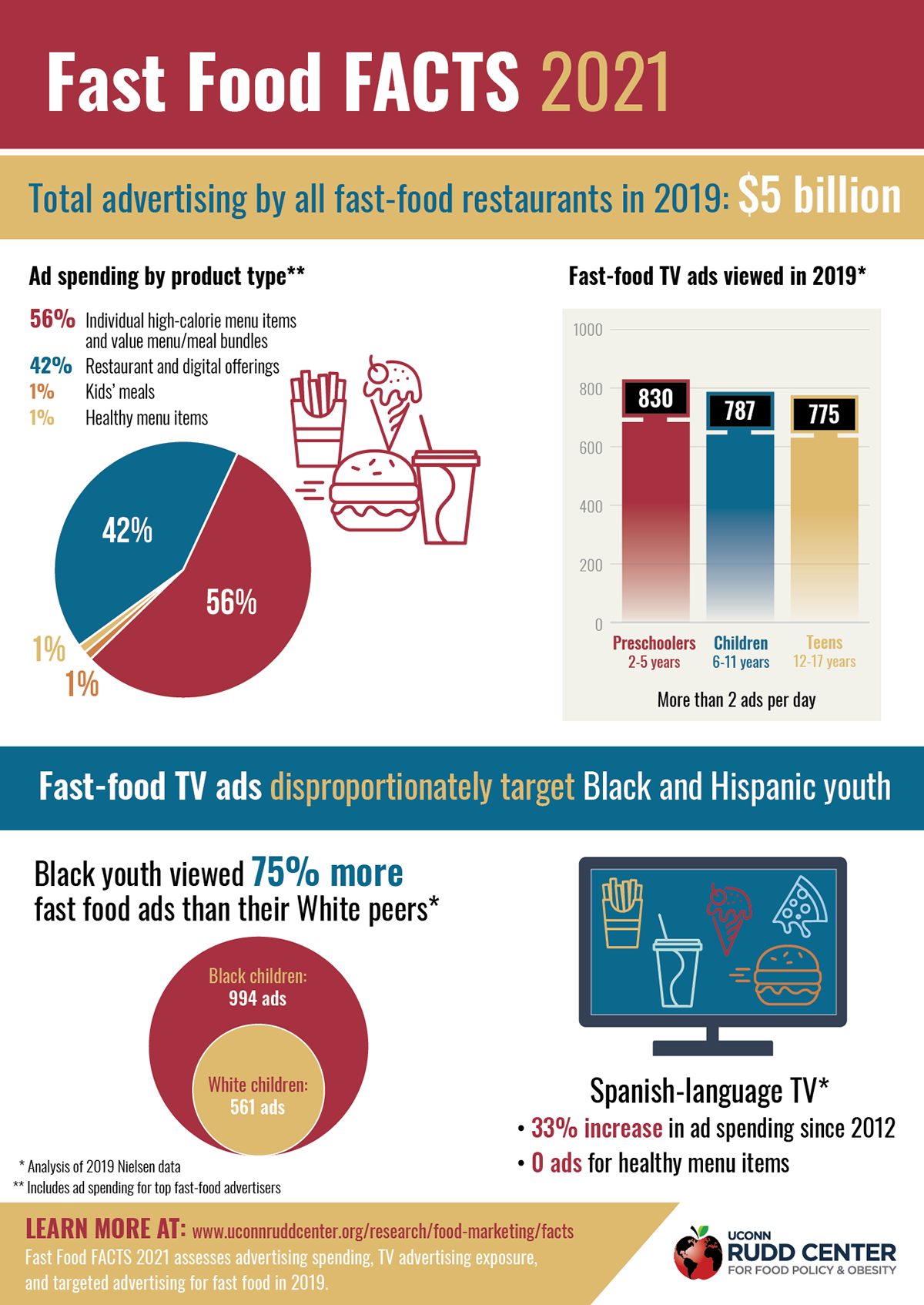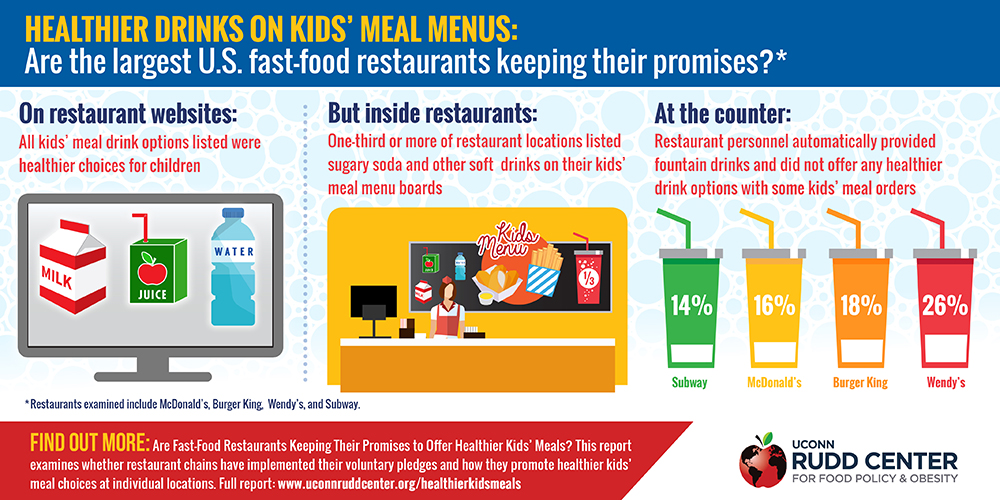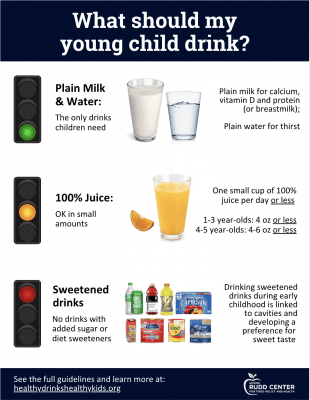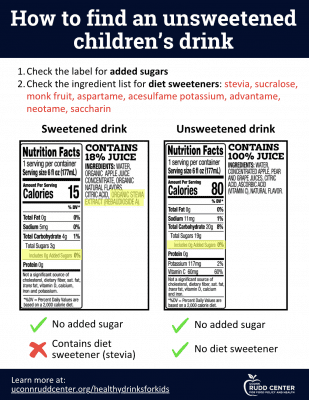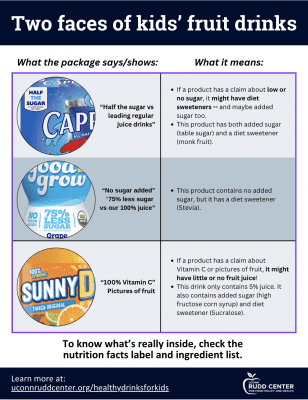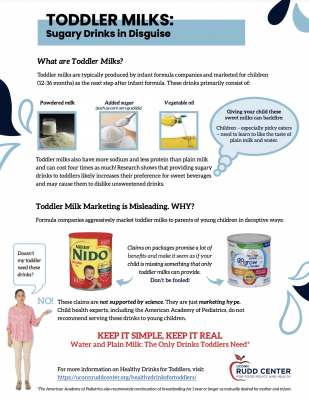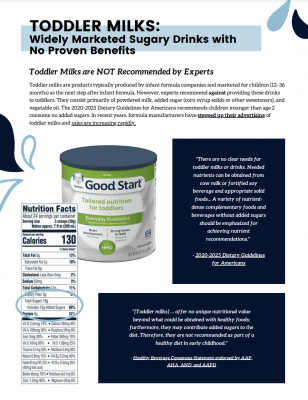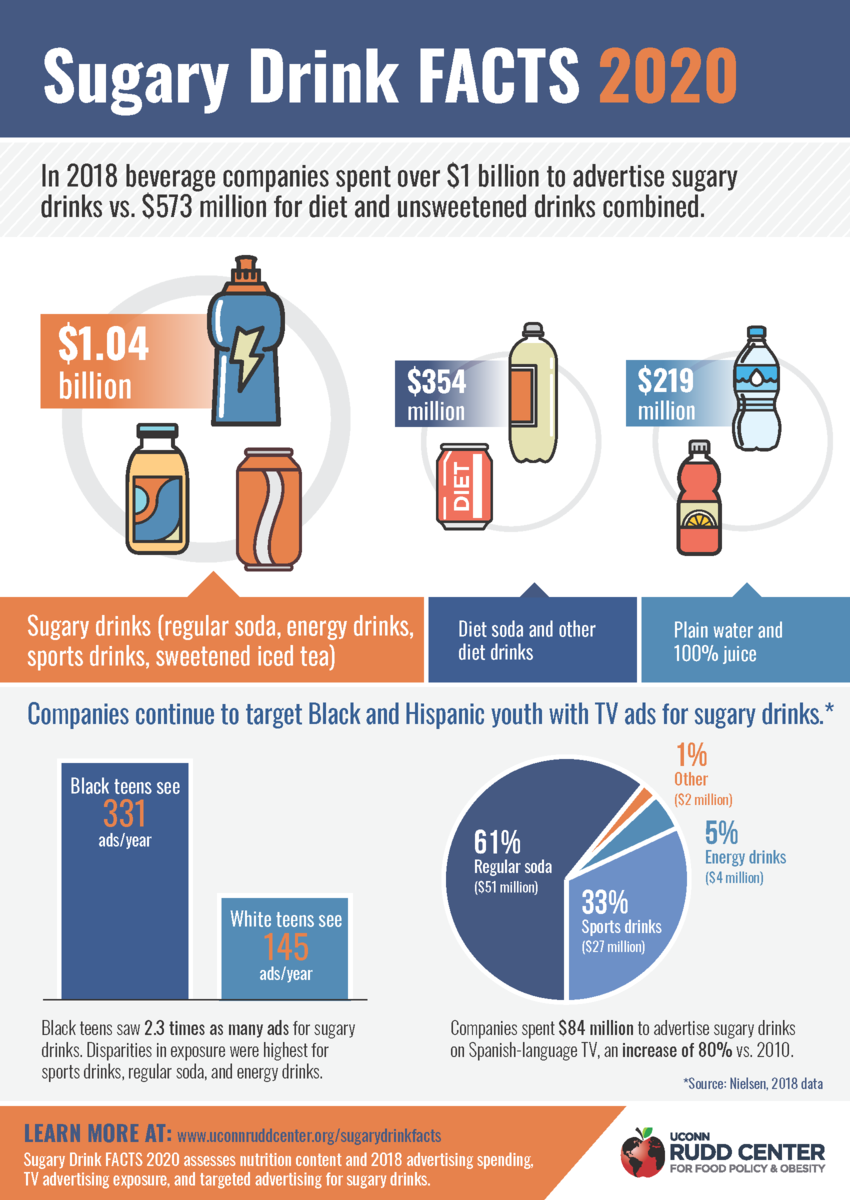Fast Food & Sugary Drinks
Approximately one-third of U.S. children and adolescents consume fast food on a given day and sugary drinks are often a part of the meals consumed, adding “empty” calories and sugar to their diets.[1] Consumption of fast food and sugary drinks contributes to chronic diseases such as type 2 diabetes, obesity, heart disease, and fatty liver disease. Yet, research shows that marketing for sugary drinks - regular soft drinks, sports drinks, energy drinks, flavored waters, sweetened teas, and fruit drinks - continues to target children and teens, including Hispanic and Black youth. Further, fast food remains the most advertised food category to children and adolescents on TV—accounting for more than one-quarter of all food-related ads viewed.
Learn More About Fast Food Marketing
Fast Food Marketing Research
- Fast-food companies’ racial justice statements and targeted marketing practices. Rudd Brief Report. May 2022
- Fast Food FACTS 2021: Billions in spending, continued high exposure by youth. Rudd Report. June 2021.
- Choi YY, Hyary M, Fleming-Milici F, Harris JL. Voluntary healthier kids’ meals policies: Are caregivers choosing kids’ meals and healthier items for their child? [published online ahead of print, 2021 May 5]. Pediatr Obes. 2021;e12797.
- Parents’ report of fast-food purchases for their children: Have they improved? Rudd Report. September 2018.
- Are fast-food restaurants keeping their promises to offer healthier kids’ meals? Rudd Report. August 2017.
- Fast Food FACTS: Measuring progress in nutrition and marketing to children and teens. November 2013.
- Fast Food FACTS 2010: Evaluating Fast Food Nutrition and Marketing to Youth. November 2010.
- Messages Promoting Healthy Kids’ Meals: An Online RCT
- Gearhardt AN, Yokum S, Harris JL, Epstein LH, Lumeng JC. Neural response to fast food commercials in adolescents predicts intake. Am J Clin Nutr. 2020 Mar 1;111(3):493-502.
- Dalton MA, Longacre MR, Drake KM, Cleveland LP, Harris JL, Hendricks K, Titus LJ. Child-targeted fast-food television advertising exposure is linked with fast-food intake among pre-school children. Public Health Nutr. 2017 Jun;20(9):1548-1556.
- Kirkpatrick SI, Reedy J, Kahle LL, Harris JL, Ohri-Vachaspati P, Krebs-Smith SM. Fast-food menu offerings vary in dietary quality, but are consistently poor. Public Health Nutr. 2014 Apr;17(4):924-31.
- Andreyeva T, Kelly IR, Harris JL. Exposure to food advertising on television: associations with children's fast food and soft drink consumption and obesity. Econ Hum Biol. 2011 Jul;9(3):221-33.
Resources
- Fast Food FACTS 2021 Social Media Supplement
- UConn Science in Seconds video: The Truth about Fast-Food Kids’ Meals
For additional information on fast food, please visit fastfoodfacts.org
Learn More About Sugary Drink Marketing
Sugary Drink Marketing Research
- Choi, Y. Y., Jensen, M. L., Fleming-Milici, F., & Harris, J. L. (2022). Caregivers’ provision of sweetened fruit-flavoured drinks to young children: importance of perceived product attributes and differences by socio-demographic and behavioural characteristics. Public Health Nutrition, 1-9. https://doi.org/10.1017/S1368980022000751
- Jensen, M. L., Choi, Y. Y., Fleming-Milici, F., & Harris, J. L. (2022). Caregivers’ Understanding of Ingredients in Drinks Served to Young Children: Opportunities for Nutrition Education and Improved Labeling. Current Developments in Nutrition, 6(1), https://doi.org/10.1093/cdn/nzab151
- Yoon Y. Choi, Tatiana Andreyeva, Frances Fleming-Milici, Jennifer L. Harris. U.S. Households’ Children’s Drink Purchases: 2006–2017: Trends and Associations With Marketing, American Journal of Preventive Medicine. 2021: ISSN 0749-3797. https://doi.org/10.1016/j.amepre.2021.06.013.
- Harris JL, Pomeranz JL. (2021). Misperceptions about added sugar, non-nutritive sweeteners and juice in popular children's drinks: Experimental and cross-sectional study with U.S. parents of young children (1-5 years). Pediatric Obesity; doi: 10.1111/ijpo.12791.
- Sugary Drink FACTS 2020. Sugary drink advertising to youth: Continued barrier to public health progress. June 2020.
- Pomeranz, JL & Harris, J.L. (2020). Children’s fruit “juice” drinks and FDA regulations: Opportunities to increase transparency and support public health. American Journal of Public Health, in press.
- Children’s Drink FACTS 2019: Sales, Nutrition, and Marketing of Children’s Drinks. October 2019
- Sugary Drink FACTS 2014. Sugary drink marketing to youth: Some progress but much room to improve. November 2014.
- Munsell, C., Harris, J.L., Sarda, V., & Schwartz, M.B. (2016). Parents’ beliefs about the healthfulness of sugary drink options: Opportunities to address misperceptions. Public Health Nutrition, 19(1), 46-54.
- Harris, J.L. & Munsell, C. (2015). Energy drinks and adolescents: What’s the harm? Nutrition Reviews, 73(4), 247-257.
- Pomeranz, J.L., Munsell, C., & Harris, J.L. (2013). Energy drinks: An emerging public health hazard for youth. Journal of Public Health Policy, 34(2), 254-271.
- Andreyeva, T., Kelly, I., & Harris, J.L. (2011). Exposure to food advertising on television: Associations with children’s fast food and soft drink consumption and obesity. Economics and Human Biology, 9(3), 221-233
- Beckman & Harris (2021). Understanding individual and socio-cultural factors associated with hispanic parents’ provision of sugar-sweetened beverages to young children.
Resources
Healthy Drinks for Kids: The marketing of fruit drinks and toddler milks portrays these products as healthy drinks for toddlers, but they are sugary drinks. Check out this resource page, which includes resources that dispel the marketing hype, inform parents about why they are not recommended for young children, and encourage caregivers to “keep it simple, keep it real” by serving water and plain milk to their toddlers.
Room for Confusion: Labeling of Fruit Drinks, Flavored Water, and Unsweetened Juices
Sugary Drink FACTS 2020:
- Report Supplement: Examples of social media campaigns targeted to teens and Hispanic and Black youth
- Report summary
Drink Nutrition Search Tool - In addition to sugar, many sugary drinks contain artificial colors, zero-calorie sweeteners, and caffeine. Use this tool to find out more.
Healthy Eating Research Beverage Consensus Statement - Research shows that what children drink from birth through age five has a big impact on their health – both now and for years to come. The nation’s leading health organizations agree that for most kids, these recommendations can help to set children on a path for healthy growth and development.
Testimony of Dr. Jennifer Harris on energy drink marketing to teens before the U.S. Senate Commerce Committee. July 2013.
For additional information on sugary drinks, please visit http://www.sugarydrinkfacts.org/.
Sugary Drink Taxes
The negative health effects of excessive consumption of sugary drinks, including weight gain and increased risk of type 2 diabetes, cardiovascular disease, dental caries, and osteoporosis, have prompted recommendations to target taxes at sugary drinks. Such taxes have been implemented so far in more than 40 countries and 8 localities in the US. Evaluations of these interventions provide increasingly strong evidence of reduced purchases of sugary drinks as a result of their taxation.
